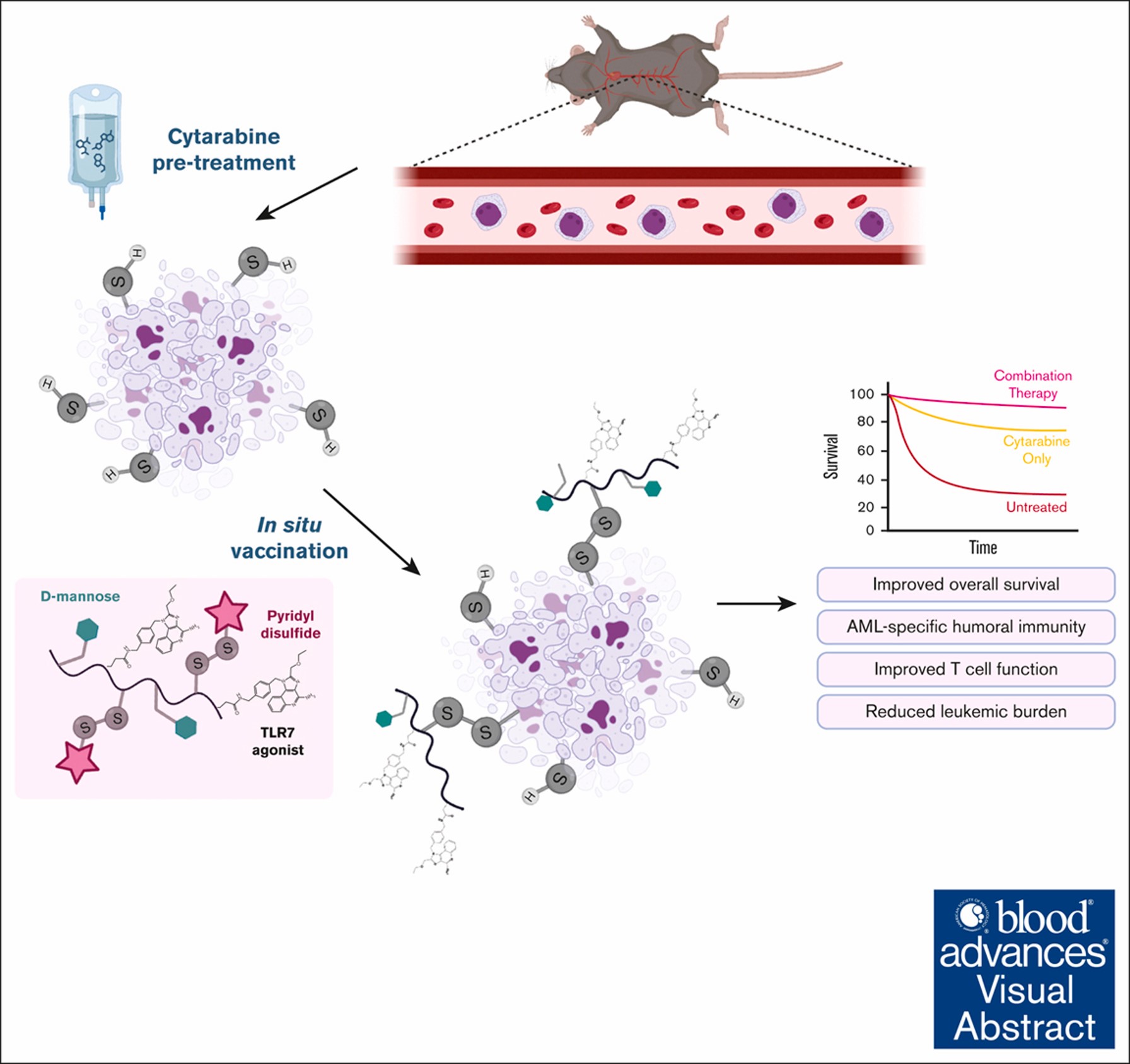SUMMARY
A cancer vaccine that enhances immune response by directly binding adjuvants to tumor cells, avoiding targeting antibodies, and reducing related side effects
The problem: Therapeutic vaccination has long been a promising avenue for cancer immunotherapy but is often limited by tumor heterogeneity with variation in the antigens present on cancer cell surfaces
- In recent years, immunotherapies have emerged as promising anti-cancer therapeutics, led by the development of immune checkpoint inhibitors (ICIs). ICIs have shown efficacy but only provide a significant survival benefit in a small fraction of patients. Further immune activation using adjuvants can provide additional efficacy in the case of immunologically “cold” tumors, which are often resistant to ICIs.
-
Toll-like receptor (TLR) agonists can powerfully trigger the innate immune system and potentiate an antigen-specific T cell response to fight against tumors. However, their clinical translation has been limited due to a narrow therapeutic window, where non-specific immune activation can produce excessive systemic inflammation and lead to chronic disease, highlighting the need for more targeted and less toxic therapeutic strategies.
-
Current approaches have several limitations, particularly regarding the immunogenicity and efficacy of adjunctive treatments. The reliance on tumor-targeting proteins often leads to the development of anti-drug antibodies, thus restricting the number of doses that can be administered effectively.
-
Additionally, small molecule TLR7 agonists have been associated with toxicity and systemic side effects when used alone. The complexity of the tumor microenvironment, characterized by hypoxia and acidosis, complicates treatment as well. These factors necessitate an alternative strategy that reduces these immunogenic and systemic risks while maintaining or enhancing the efficacy of cancer immunotherapies.
The proposed solution: A fully synthetic platform for cancer therapy by delivering immune-activating agents directly to tumor cells by exploiting unique tumor microenvironment properties improving efficacy and reducing systemic side effects
- The faculty inventor, Jeffrey Hubbell, developed a fully synthetic cancer vaccine platform with delivery of tumor-targeting adjuvants directly to cancer cells without the need for antibodies. This technology utilizes pyridyl disulfide (PDS) moieties to exploit the excess unpaired cysteines on the surface proteins of tumor cells, enabling the binding of vaccines directly to the tumor.
-
These vaccines incorporate Toll-like receptor (TLR) agonists such as TLR7/8, TLR9, TLR4, or TLR2/6 to activate the immune system robustly against the tumors while minimizing systemic inflammation. Mannose groups are also included in the polymer structure to encourage uptake by antigen-presenting cells like dendritic cells, thus maximizing the immune response at the tumor site and tumor-draining lymph nodes.
-
The technology eliminates the need for targeting antibodies, which significantly reduces the potential for anti-drug antibody development that can hamper the efficacy of cancer treatments. The synthetic nature of the platform allows precise customization of the polymer structure, facilitating targeted activation of the immune system while minimizing toxicity.
-
By binding directly to tumor cells through the recognition of metabolic stress markers specific to cancer's microenvironment, the platform offers enhanced localization of immune activation and reduces the systemic side effects commonly associated with broader immunotherapeutic approaches. This precise delivery system opens new avenues for the efficient and safer treatment of cancers, particularly those that are resistant to existing therapies.
FIGURE
ADVANTAGES
ADVANTAGES
-
Improves immunotherapy efficacy and toxicity in cold tumors
-
Minimizes systemic inflammation by localizing immune activation to tumors
-
Reduces development of anti-drug antibodies by eliminating the need for targeting antibodies
-
Enhances uptake by antigen-presenting cells
APPLICATIONS
PUBLICATIONS
- Anna J. Slezak, Kevin Chang, Taryn N. Beckman, Kirsten C. Refvik, Aaron T. Alpar, Abigail L. Lauterbach, Ani Solanki, Jung Woo Kwon, Suzana Gomes, Aslan Mansurov, Jeffrey A. Hubbell; Cysteine-binding adjuvant enhances survival and promotes immune function in a murine model of acute myeloid leukemia. Blood Adv 2024; 8 (7): 1747–1759
June 3, 2024
Proof of concept
Patent Pending
Licensing,Co-development
Jeffrey Hubbell